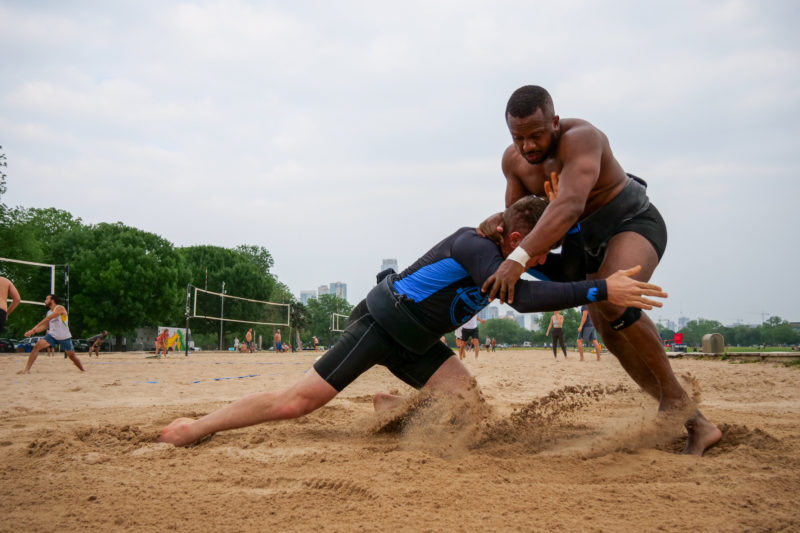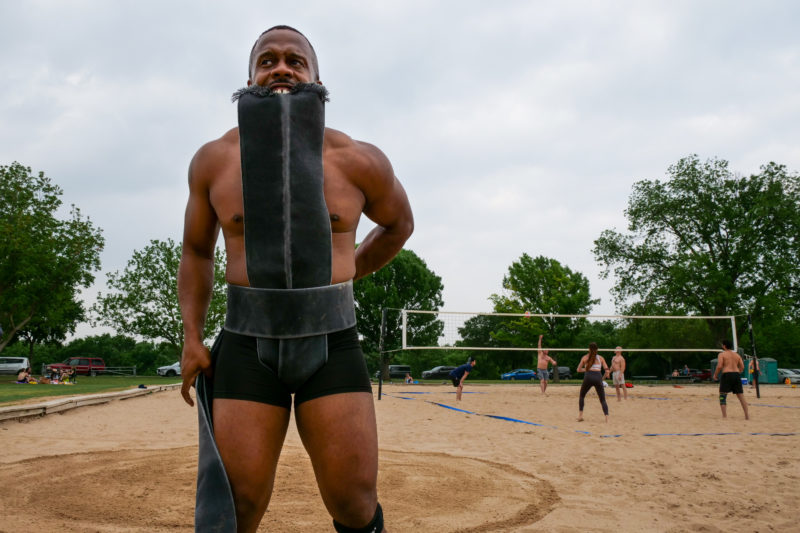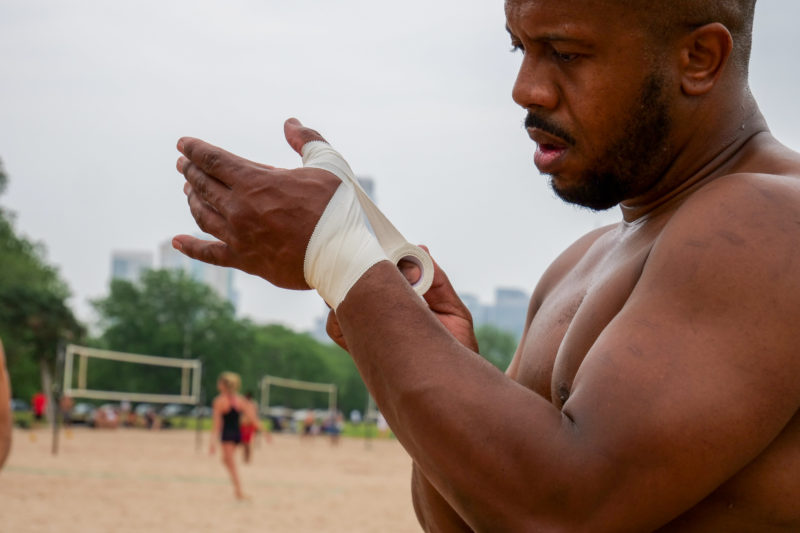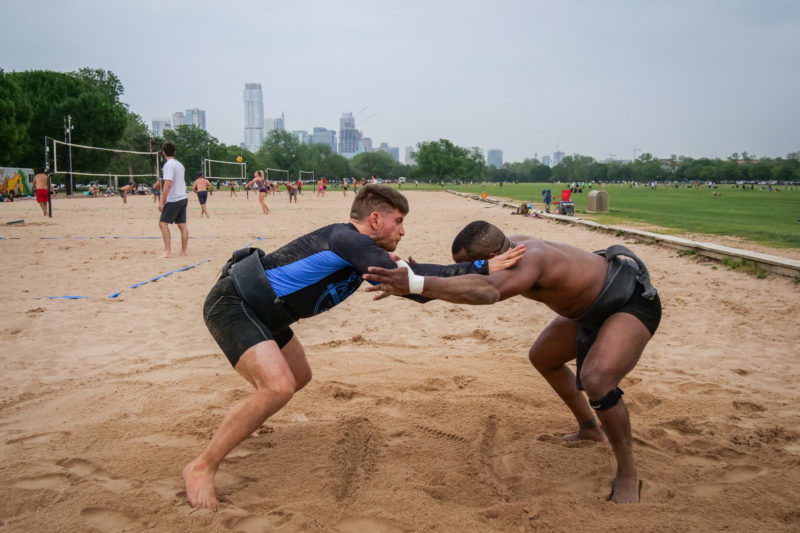Austin Sumo Wrestlers Prepare for National Competition
By Ramón Rodriguez
Reporting Texas

Justin Kizzart, right, pushes Chad Neu to the ground during a sumo wrestling match at the Zilker Metropolitan Park volleyball courts on Wednesday, April 28, 2021. Kizzart and Neu are training for the U.S. National Sumo Championships in Dripping Springs on June 19, 2021. Kizzart is the reigning champion of the lightweight division while Neu is unranked and hoping to place in the top three. Kirsten Hahn/Reporting Texas
Eros Armstrong brought demons back with her after serving in the Air Force military police. Stationed in South Korea, Italy and Germany, Armstrong says she was sexually assaulted after reporting fellow officers for misconduct, resulting in panic attacks, memory loss, sleepless nights, a bitter divorce and agoraphobia.
For years, she used weightlifting to cope with her PTSD, but when a good friend of hers who would come over to discuss scripture and teach her web development took her to Dark Circle Sumo in Austin, Armstrong found a mentor in its owner, Justin Kizzart.
That was September 2019. Armstrong would win the national women’s heavyweight sumo wrestling title the following March.
Now, the 288-pound Armstrong competes on the U.S. national sumo team and is anticipating this year’s nationals coming to her home city of Austin. If she wins nationals twice, she qualifies for the World Games, where she hopes to hold up the Texas flag next to the American flag and dedicate her victory to her recently passed grandfather.
“I feel sorry for anyone who’s getting in my way this upcoming nationals. I’m so sorry, I have a goal. And I politely will have to ask you to move out of my way,” said Armstrong, 32.
To win a sumo match, a wrestler must force their opponent out of the ring or make them touch the ground with any part of their body other than their feet.
In its home country of Japan, sumo wrestling is a beloved, but niche, sport tied to a fading tradition, and television ratings have fallen due to match-fixing scandals and many of its most accomplished wrestlers now hailing from Mongolia.
But over the past 20 years, the male-dominated sport has found increasing popularity outside of Japan among wrestlers of different genders, weight classes and racial backgrounds. In 2022, the sumo World Games will be held in the U.S., in Birmingham, Ala — an opportunity to put American sumo on the map.
Dark Circle Sumo alone boasts three wrestlers on Team USA, including Kizzart, who competes as a men’s lightweight.
“This is huge. This is the Olympics for us,” Kizzart said of the upcoming nationals.

Justin Kizzart, 38, puts on a mawashi, or loincloth, at the Zilker Metropolitan Park volleyball courts on Wednesday, April 28, 2021. Kizzart runs Dark Circle Sumo in Austin where he teaches students the techniques of sumo. He and students practice at the Zilker volleyball courts every Wednesday. Kirsten Hahn/Reporting Texas
On a Sunday afternoon in late March, Kizzart and Chad Neu are the only two to make it to that week’s “keiko,” or practice. They squat on opposite sides of a ring constructed on foam pads and perform a ritual called “chiri-chozu” that involves clapping — to alert the gods of the impending match — and raising one’s arms to reveal that neither wrestler is carrying a weapon.
They square up in the center, Neu throws off his mask, they stare one another down, then press their knuckles down and Kizzart calls “Hakkeyoi!” They grapple fiercely, constantly switching direction and momentum as they attempt to force the other out of the ring.
Finally, Kizzart succeeds in dancing Neu out of the ring and there’s no more commotion — only the sound of rapper Danny Brown filling the air. The whole thing lasts under 20 seconds, and they seem tired, but they’ll be at it for nearly another hour.
Kizzart, 39, opened Dark Circle in early 2019. He’d fallen in love with sumo while watching it with his Japanese wife’s grandmother in Japan. When he came back to Los Angeles, he did some Googling to find a team, finding out that the largest sumo team in the country was right there in L.A.
Suffering from career burnout and in desperate need of a change of pace, Kizzart quit his job as a designer in the fashion industry in 2018, and he and his wife moved to Austin — where he discovered that the nearest sumo club was an hour-and-a-half away, in San Antonio. He drove to San Antonio every Tuesday, but when the drive got tiring, he decided Austin needed a sumo club of its own. Encouraged by Texas’ potential for sumo — due to an abundance of “big people” — he opened Dark Circle.
“I learned from the best in L.A., and I can teach others,” Kizzart said.

Justin Kizzart, 38, wraps his hand at the Zilker Metropolitan Park volleyball courts on Wednesday, April 28, 2021. Kizzart recently injured one of the ligaments in his hand during a sumo match. Kirsten Hahn/Reporting Texas
Kizzart says he’s the biggest sumo fanatic in Austin — he recommends sumo anime to his students, and he plays sumo on television at the saké bar where he works as a bartender on weekends — but he says Armstrong “is the one to beat in the U.S.”
He praises Armstrong’s passion and strength — she bench presses 275 pounds, more than any of the men at Dark Circle — and said she believes she has what it takes to compete with international heavyweights from sumo-loving countries like Russia and Japan. She says she is drawn to sumo’s unbridled physicality and describes the heat of competition after a “hakkeyoi” as a kind of sanctuary for her.
“In that moment, I am free. I am free. And within that circle, it is mine. It is my zone. And there’s no pain, there’s no fear, there’s just that moment of like trying to get them out of your ring or trying to get them to kneel in your ring,” Armstrong says.
Jessica Hopper, 26, has been sumo wrestling in San Antonio since high school. At 22, after two years of competing, Hopper placed eighth in the women’s open weight world championships in Osaka, Japan.
Armstrong describes Hopper as a friendly rival. Hopper says the only time she ever cried in competition was in 2020 after coming off an ankle injury and facing Armstrong in Armstrong’s first competition — an open-weight tournament in San Antonio. Hopper — a lightweight who stands 5-foot-2 — describes being picked up about two or three feet in the air and thrown out of the ring by the 5-foot-11 Armstrong, landing on the ankle that had been keeping her out of competition.
“I was such a baby,” Hopper laughs.
As with Armstrong and Kizzart, sumo dominates Hopper’s life. She sizes up women at the grocery store, but holds herself back from approaching them to tell them of their potential for the sport. She is equally excited for nationals and to bring honor to her home state and to clear up the misconceptions many have about sumo — she laughs off the fat jokes and the diaper jokes, but some remarks get to her.
“The one that gets me the most is when I first tell people that I’m a sumo wrestler. They always do a double take and they’re like, ‘But you’re so small,’” Hopper, a high school science teacher, says.
And while those misconceptions are something Armstrong and Kizzart battle when explaining their passion for the sport, there is another element to the competition for them — both are Black, and Kizzart made a point to schedule nationals on June 19 of this year.
June 19 is Juneteenth, which marks the anniversary of the emancipation of Texas slaves two-and-a-half years after Abraham Lincoln outlawed slavery in the United States.
A major draw for Armstrong is sumo’s spirit of gratitude for one’s forebears — which is why she hopes to dedicate a win to her grandfather. For Armstrong, the sumo world has been more accepting than regular civilian life, particularly when it comes to welcoming other ethnicities, and it’s a trend she hopes to continue.
“I better leave my mark so that there can be some little girl that might look like me who’s going to be like, ‘I can do that?’ And I can be like, ‘Yes. It has already been done,’” Armstrong says.

Justin Kizzart, right, spars with Chad Neu at the Zilker Metropolitan Park volleyball courts on Wednesday, April 28, 2021. Kirsten Hahn/Reporting Texas